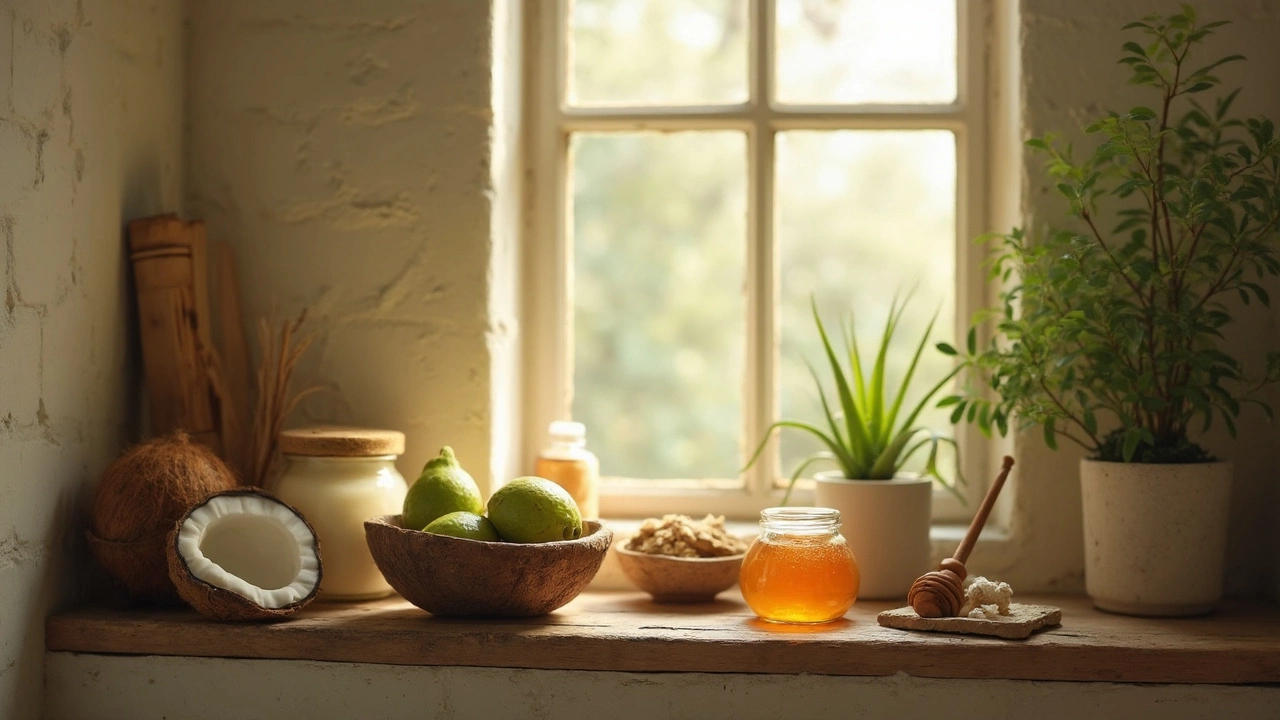Best Natural Remedies for Your Skin: A Closer Look
 Feb, 25 2025
Feb, 25 2025
In a world filled with countless skincare products, it can be overwhelming to find what's truly best for your skin. For many, turning back to nature seems like a smart choice. Natural remedies have been trusted for centuries, offering safe and effective results without synthetic chemicals lurking in some commercial products. But what exactly makes natural remedies so beneficial?
Our skin craves ingredients that are pure and close to their natural state. Things like honey, aloe vera, and coconut oil top the list as natural powerhouses. Did you know honey isn't just sweet? It has antibacterial properties that can help clear up pesky pimples and soothe inflamed skin. Plus, aloe vera isn't just for sunburns—it hydrates and nourishes, leaving your skin looking fresh and plump.
- Why Natural is Better
- Powerful Ingredients in Your Kitchen
- Plant-Based Products Worth Trying
- Simple Tips for Incorporating Naturals
Why Natural is Better
Choosing natural remedies for your skin isn't just a feel-good trend—it's got some solid science backing it up. When we use organic skincare, we're avoiding a slew of synthetic chemicals found in many everyday products. These additives can sometimes irritate the skin or disrupt natural processes. Instead, natural ingredients tend to work with your skin, enhancing its natural functions rather than overwhelming it.
Natural remedies often come with nutrient-rich elements like vitamins, antioxidants, and essential fatty acids that are crucial for skin health. Ingredients like avocado, rich in Vitamin E, or chamomile, known for its calming effects, are great examples. They provide your skin with the nourishment it needs while also protecting it from environmental damage.
"Mother Nature has equipped us with everything we need for beauty and wellness," states Dr. Jane Smith, a renowned dermatologist and advocate of natural skincare.
Another benefit? Reduced risk of allergic reactions. With natural ingredients, especially those you can find in your own kitchen, it's much easier to track and test what works for you. You're also doing the environment a favor—natural products typically involve sustainable practices and biodegradable packaging.
Finally, using natural products can be more budget-friendly. Many items such as olive oil, oats, or yogurt serve as natural remedies and staples in our kitchens. Simply applying a honey mask once a week can make a noticeable difference, and it won't break the bank!
| Ingredient | Main Benefit |
|---|---|
| Aloe Vera | Hydration |
| Coconut Oil | Moisturization |
| Green Tea | Antioxidant |
So next time you're wondering about the best approach to skincare, going natural might just be your best bet. It's safe, effective, and often easy on the wallet.
Powerful Ingredients in Your Kitchen
You might be surprised at how many items in your kitchen can double as organic skincare treatments. These pantry staples aren't just great for cooking—they're some of the best remedies for your skin.
Honey: Nature's Sweet Healer
Honey isn't just for sweetening tea. Thanks to its antibacterial properties, it's a superstar for treating acne and soothing irritated skin. Dab a bit on blemishes before bed or use it as a face mask mixed with yogurt for added moisture and exfoliation.
Aloe Vera: Your Skin's Best Friend
Aloe vera isn't solely a post-sunburn savior. It's super hydrating, making it perfect for dry, flaky skin. Try mixing a spoonful of pure aloe gel with a few drops of coconut oil for a nourishing overnight treatment.
Coconut Oil: The All-Rounder
This oil isn't just for cooking up a storm. It's a great moisturizer and works wonders on dry patches. Apply directly to your skin or mix with sugar for a natural exfoliant. Just be cautious if you're prone to acne, as it might be too heavy for some skin types.
Oatmeal: The Calm Maker
Oatmeal does more than just provide a hearty breakfast; it's famous for its soothing properties. An oatmeal bath can alleviate itchy skin or a rash, offering relief and leaving skin soft.
Apple Cider Vinegar: Tone Right
Apple cider vinegar can be diluted with water to create a refreshing toner. It balances pH levels and tightens pores. Just remember, moderation is key, especially if you have sensitive skin.
If you're more into data, consider this quick look at how these ingredients stack up.
| Ingredient | Benefit |
|---|---|
| Honey | Antibacterial |
| Aloe Vera | Hydrating |
| Coconut Oil | Moisturizing |
| Oatmeal | Soothing |
| Apple Cider Vinegar | Toning |

Plant-Based Products Worth Trying
If you're keen on taking the organic skincare route, plant-based products are a goldmine. They've been used for ages and cater to different skin needs without the harsh side effects of synthetic alternatives. Let's dive into some of the superstars in this field.
The Magic of Tea Tree Oil
Tea tree oil is like a knight in shining armor for those battling acne. Packed with antibacterial properties, it's known to reduce breakouts without drying out your skin. Just dab a tiny bit wherever needed, and let it do its magic overnight.
Coconut Oil: More Than Just a Kitchen Staple
This versatile oil isn't just for cooking. Coconut oil is a fantastic moisturizer, especially for those with dry skin. Its saturated fats help lock in moisture, making your skin feel super soft and supple. A simple tip? Use it as a hydrating night cream.
Rosehip Oil for Youthful Glow
Ever heard of rosehip oil? Beloved for its anti-aging benefits, this oil is rich in vitamins A and C. Together, they help reduce the appearance of scars, wrinkles, and even out skin tone. A few drops every night can leave you with a youthful glow.
Aloe Vera: The Soothing Gel
We've all reached for aloe vera after a sunny day, but this plant is more than a sunburn remedy. It hydrates, reduces inflammation, and even helps with acne-prone skin. Applying the gel directly from the plant ensures you're getting the freshest product.
- Tip: For best results, apply these oils and gels after cleansing to allow maximum absorption.
These plant-based products are worth a try if you're serious about skin health. They offer an effective, natural route to clear and glowing skin, making them a fantastic addition to your skincare arsenal.
Simple Tips for Incorporating Naturals
Switching to organic skincare doesn't have to be complicated or costly. The beauty of using natural remedies lies in their simplicity and accessibility right from your kitchen or garden.
Start with What You Have
Before you rush out to buy new products, check your pantry. Olive oil, for instance, isn't just for salads. It makes a fantastic moisturizer thanks to its healthy fats and antioxidants. Simply apply a few drops to your face after cleansing for a soft, nourished glow.
The Power of Routine
Incorporating natural remedies isn't about a one-time fix; it's about developing a routine. Try a weekly honey mask. Just spread a thin layer of raw honey on your face, leave it on for 20 minutes, and rinse with warm water. Honey helps to both moisturize and clear the skin.
Introduce One Thing at a Time
When trying new natural remedies, take it slow. Introducing too many new ingredients at once might irritate your skin rather than help it. Aim to try one new treatment per week and gradually find what works best for skin health.
DIY Treatments to Explore
- Coconut Oil Cleanser: Use it to remove makeup while hydrating your skin.
- Aloe Vera Soother: Fresh from the plant, it works wonders for redness and irritation.
- Oatmeal Exfoliant: Grind oats into a fine powder, mix with a bit of yogurt, and gently scrub for smoother skin.
Remember, consistency is key and listening to your skin's needs will guide you in finding the perfect natural remedies.
